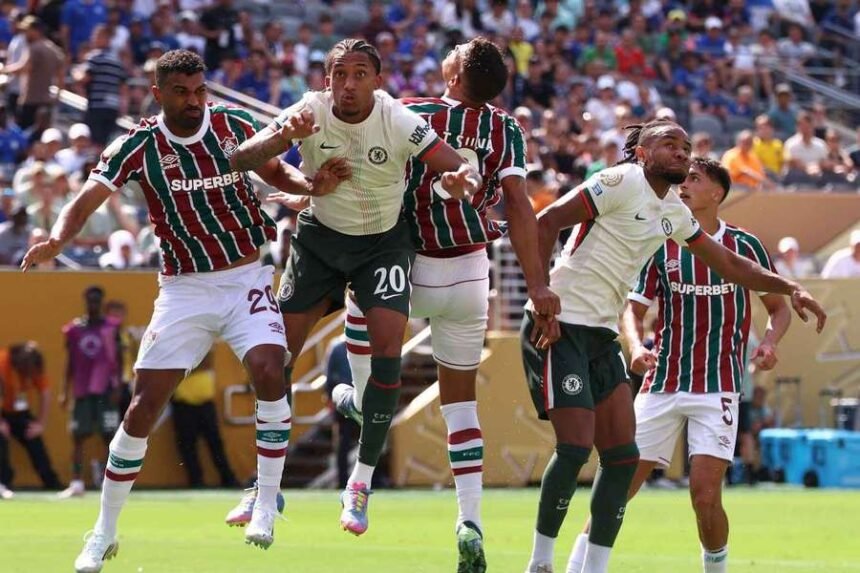Before the opening whistle at MetLife Stadium, much of the pre-match attention centered around Thiago Silva’s emotional meeting with his former club. But as the match unfolded, it was another former Flu talent who stole the spotlight—and the result.
João Pedro, returning to face the club where he first made his name, delivered a ruthless display in front of goal to send Chelsea through to the Club World Cup final. His brace, one in each half, was the difference in a contest that exposed both the aging legs and tactical limitations of a Fluminense side that simply couldn’t match Chelsea’s intensity or precision in key moments.
Experience vs Energy
Fluminense came into the match with the oldest starting XI in Club World Cup history—averaging over 31 years per player—and it showed. Though goalkeeper Fábio broke records by starting at age 44, the broader issue was a lack of mobility and sharpness across the pitch.
Enzo Maresca, meanwhile, continued his rotational strategy with three fresh changes from the side that beat Palmeiras, and it paid immediate dividends. Chelsea fired off three shots in the opening 11 minutes, moving the ball crisply and asserting territorial dominance early.
João Pedro’s Moment of Magic
It took just 18 minutes for Chelsea to break through. A clever bit of work from Pedro Neto—whose lively dribbling caused problems all evening—ended with a dangerous ball into the box. Thiago Silva’s miscued clearance fell straight to João Pedro, who rifled home a composed finish against his former team. It was a poignant moment and a goal that shifted the match’s balance definitively.
Chelsea’s scoring form in this tournament has been widely shared across the squad, with nine different scorers in their last nine Club World Cup goals. That sort of attacking depth again proved vital, even as Fluminense briefly threatened to respond.
Hércules thought he’d drawn his side level with a smart finish past Robert Sánchez, but Marc Cucurella produced a stunning goal-line clearance to deny him. VAR later came to Chelsea’s rescue as well, overturning a penalty call against Trevoh Chalobah after a handball review deemed his arm to be in a natural position.
Control and Ruthlessness
Chelsea came out after the break with even more purpose. João Pedro’s second goal—an emphatic strike off the underside of the bar after a visionary pass from Enzo Fernández—effectively ended the contest just 10 minutes into the second half.
Maresca’s side controlled 65.4% of the ball in that period, pinning Fluminense deep and dictating play with a maturity that belied their youth. Nearly 51% of second-half action took place in the Brazilians’ final third, as Chelsea turned the screw.
Pedro Neto, again, was central to the attacking effort, racking up his tournament-high 18th successful dribble. But frustration still crept in. Cole Palmer’s visible annoyance after Nicolas Jackson opted to shoot from a tight angle rather than square the ball for a tap-in underlined the players’ hunger to impact the game, even with the result seemingly secure.
Chalobah Anchors the Backline
At the other end, Chalobah quietly delivered a masterclass. Completing all 54 of his pass attempts, he mirrored the tournament’s best passing performance (second only to Jonathan Tah’s 67 for Bayern) and offered calm, composed leadership at the back.
Fluminense, for all their spirit, couldn’t find a breakthrough. Arias, their standout creative force, created two more chances to add to his tournament-high tally of 18, but there was little cutting edge ahead of him.
Their 12 shots—only five of which troubled Sánchez—told the story. Despite winning more tackles and attempting more crosses, the Brazilians lacked a consistent goal threat. René’s three touches in the Chelsea penalty area were the joint-highest for Fluminense, compared to eight from Christopher Nkunku for the Blues.
A Step Too Far for Flu
Fluminense can be proud of their run to the semifinals, but against Chelsea, their physical limitations and lack of end product were ruthlessly exposed. Hercules, their standout ball-winner, ended with 10 tackles across the tournament, joint-second overall. Yet stats alone couldn’t compensate for the gulf in execution.
For Chelsea, the win marks their fifth international final since 2019—each of the previous four ending in silverware. With Real Madrid or PSG awaiting in the final, Maresca’s men have put themselves in a strong position to add another chapter to the club’s growing international pedigree.
Silva may have had the emotional reunion, but João Pedro had the last word.











